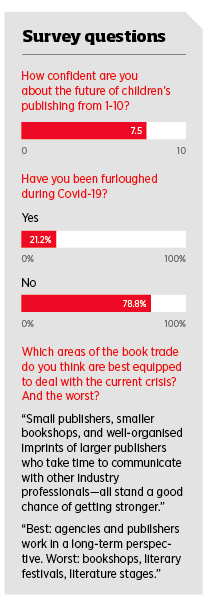You are viewing your 1 free article this month. Login to read more articles.
Children’s trade optimistic sector can weather the pandemic after sales boost
 The children’s book trade is feeling positive about book sales, but there are concerns over the dominance of celebrity authors and Amazon, as well as the dwindling number of projects for authors and freelance workers, according to a survey commissioned by The Bookseller.
The children’s book trade is feeling positive about book sales, but there are concerns over the dominance of celebrity authors and Amazon, as well as the dwindling number of projects for authors and freelance workers, according to a survey commissioned by The Bookseller.
When asked how confident they were about the post-Covid-19 future of children’s publishing on a scale of one to 10—with 10 being the most positive—the respondents (who came from a range of jobs) gave an average answer of 7.5. Most said strong sales were the reason for their optimism, with one saying people are buying and reading children’s books “more than ever”.
“Parents being at home during the pandemic means more need to entertain, educate and assist generally with relationships, and books are a great resource,” said one respondent. “It’s a big market and it’s getting bigger.”
Another said children’s books will “always” be needed for literacy and development, and someone else said literacy is a vital tool in helping children understand what is going on in the world around them—citing the Black Lives Matter movement.
There were, however, concerns over celebrity publishing. One person who filled in the survey said the industry is “flooded” with celebrity books, making it difficult for other authors to break through, while another said they despaired “daily” at the amount of investment in celebrities compared to how much is invested in authors’ long-term careers. There is also a lack of diversity, they said.
There was a comment about the widening gap between the high and the low advances that are being offered, with some manuscripts going for “millions” and others for very little.
The retail picture
Another fear is that the dominance of Amazon during lockdown and beyond means it will be harder for independent bookshops to survive, despite their efforts to move business online. When asked who was best equipped to deal with the crisis and who was worst, one response was: “Best: Amazon. Worst: everyone else.”
There were varying responses to a question about the change in workload, with some having more to do, and some less. Those who had more in their in-tray gave reasons including covering for furloughed colleagues, or being unable to switch off because of working at home.Only 20.8% of respondents had been furloughed, although many freelances said their hours and projects had been drastically cut.
“I worry about how much work there will be for freelances in 2021,” said one. “I worry about [the lack of] book events and book sales, and how we can replicate this online. I’m often employed to organise and execute book tours and this side of my work has dried up completely.”
Another said: “The book I had expected to be commissioned has been put on ice, pending international interest. After the next two royalty statements, I won’t have any further income.”
When asked if they had learned anything during the pandemic that they will continue to apply to their businesses once the crisis has passed, those surveyed gave a variety of answers. Many respondents said they would work from home more and several said they are now more aware of the importance of social media and digital marketing. Being flexible as a business was also flagged. One stated a positive move was “taking action quickly to respond to our audience’s need, but not being afraid to adapt that action as circumstances change. That applies to working with others in-house as well as how we’re talking to our consumers. I think we’ve become a little more agile and adaptable, and I hope that will continue.”
Just over 10% of respondents were from an editorial background, while 22.5% were authors or illustrators. More than 12% were freelancers, and 10% were booksellers. The rest were from sales, marketing, publicity, design, libraries and “other”.














